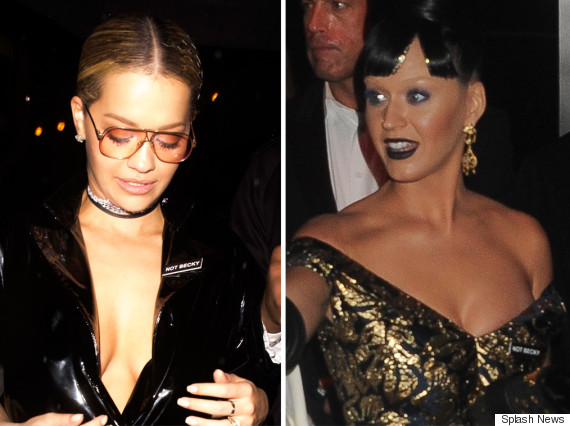Please let's nip the 'Not Becky' fashion in the bud before it begins.
Rita Ora, who has been fending off a storm of angry buzz from the more irate members of the Beyhive since she donned a lemon print bra, decided to use another fashion statement to hammer home the fact that she is not "Becky with the good hair".
She wore a pin emblazoned with the words 'Not Becky' to a Met Gala afterparty. Katy Perry also donned a 'Not Becky' pin - perhaps as a sign of support for Ora who has been the victim of intense trolling.
I fear it is now only a matter of time before the first 'Not Becky' slogan tees pop up on the high street and this is not a good thing.
![rita katy]()
While in this instance the pins may have been intended to be a symbol of female friendship and solidarity, this is not a feminist slogan.
"Becky with the good hair" is a lyric loaded with layers of meaning tied up with the damage caused by racially prejudiced ideas of 'good hair', so using the lyric to launch a witch hunt after a single woman is missing the point - as is declaring you are 'not Becky' to make a statement about how you have never been the "other woman".
'Not Becky' as a slogan, removes the racial undertones of the original lyric and turns the focus squarely on the 'other woman'.
Making a public statement that you are 'not Becky', suggest women are pitted against women in a battle for a man's affections and places the blame for unfaithfulness firmly on the shoulders of the woman.
Let's be clear here - this woman hating is not something Lemonade does.
In the album Beyoncé expresses a multitude of emotions in relation to infidelity, one of which is anger - unabashed baseball bat-swinging anger - but that anger is directed at one person: the cheating partner.
The lyric "Becky with the good hair" is addressed as a disdainful comment about her cheating partner's behaviour.
Beyoncé directs the anger at the man who entered into a relationship with her and let her down - not at Becky.
The visual aspect of the album is also the antithesis of woman hating. Beyoncé surrounds herself with strong black women, including Serena Williams, Amandla Stenberg and Zendaya. She doesn't see them as a threat and embraces the strength that can be found in a group of women.
As a self-proclaimed feminist, Beyoncé has helped raise the confidence and self-worth of many girls and grown women.
Beyoncé's music and politics is a uniting force, not a dividing one. Let's not undo that good work with a slogan.
Rita Ora, who has been fending off a storm of angry buzz from the more irate members of the Beyhive since she donned a lemon print bra, decided to use another fashion statement to hammer home the fact that she is not "Becky with the good hair".
She wore a pin emblazoned with the words 'Not Becky' to a Met Gala afterparty. Katy Perry also donned a 'Not Becky' pin - perhaps as a sign of support for Ora who has been the victim of intense trolling.
I fear it is now only a matter of time before the first 'Not Becky' slogan tees pop up on the high street and this is not a good thing.

While in this instance the pins may have been intended to be a symbol of female friendship and solidarity, this is not a feminist slogan.
"Becky with the good hair" is a lyric loaded with layers of meaning tied up with the damage caused by racially prejudiced ideas of 'good hair', so using the lyric to launch a witch hunt after a single woman is missing the point - as is declaring you are 'not Becky' to make a statement about how you have never been the "other woman".
'Not Becky' as a slogan, removes the racial undertones of the original lyric and turns the focus squarely on the 'other woman'.
Making a public statement that you are 'not Becky', suggest women are pitted against women in a battle for a man's affections and places the blame for unfaithfulness firmly on the shoulders of the woman.
Let's be clear here - this woman hating is not something Lemonade does.
In the album Beyoncé expresses a multitude of emotions in relation to infidelity, one of which is anger - unabashed baseball bat-swinging anger - but that anger is directed at one person: the cheating partner.
The lyric "Becky with the good hair" is addressed as a disdainful comment about her cheating partner's behaviour.
Beyoncé directs the anger at the man who entered into a relationship with her and let her down - not at Becky.
The visual aspect of the album is also the antithesis of woman hating. Beyoncé surrounds herself with strong black women, including Serena Williams, Amandla Stenberg and Zendaya. She doesn't see them as a threat and embraces the strength that can be found in a group of women.
As a self-proclaimed feminist, Beyoncé has helped raise the confidence and self-worth of many girls and grown women.
Beyoncé's music and politics is a uniting force, not a dividing one. Let's not undo that good work with a slogan.